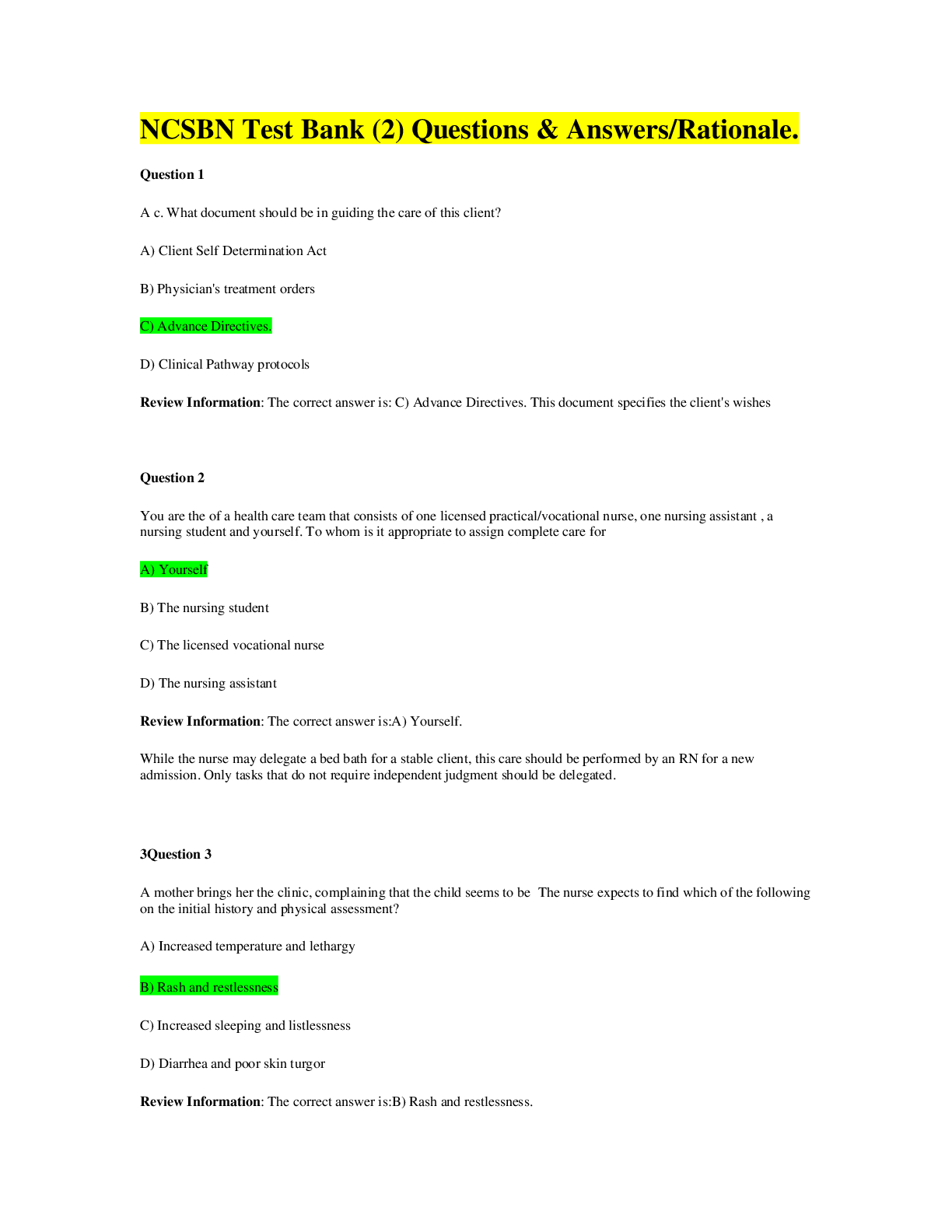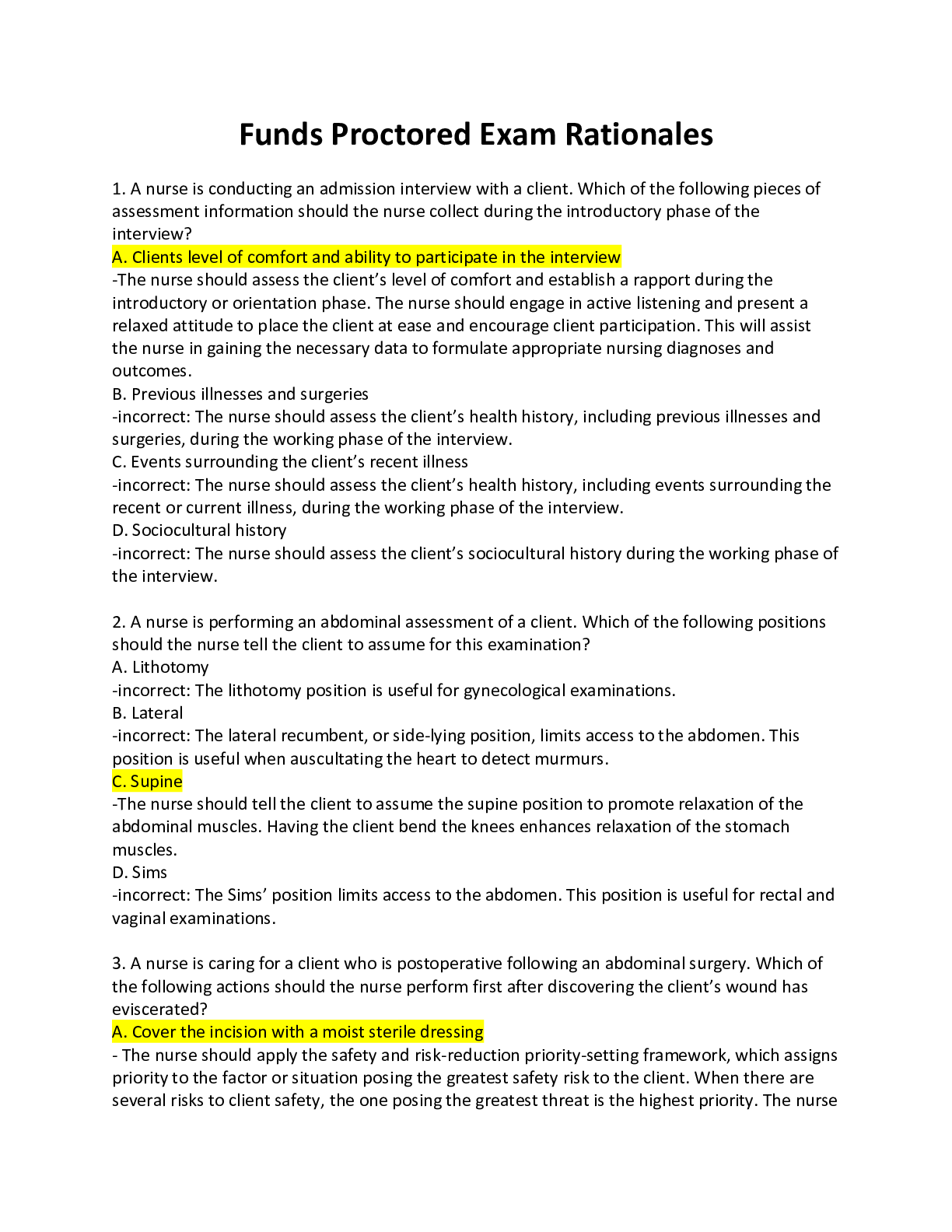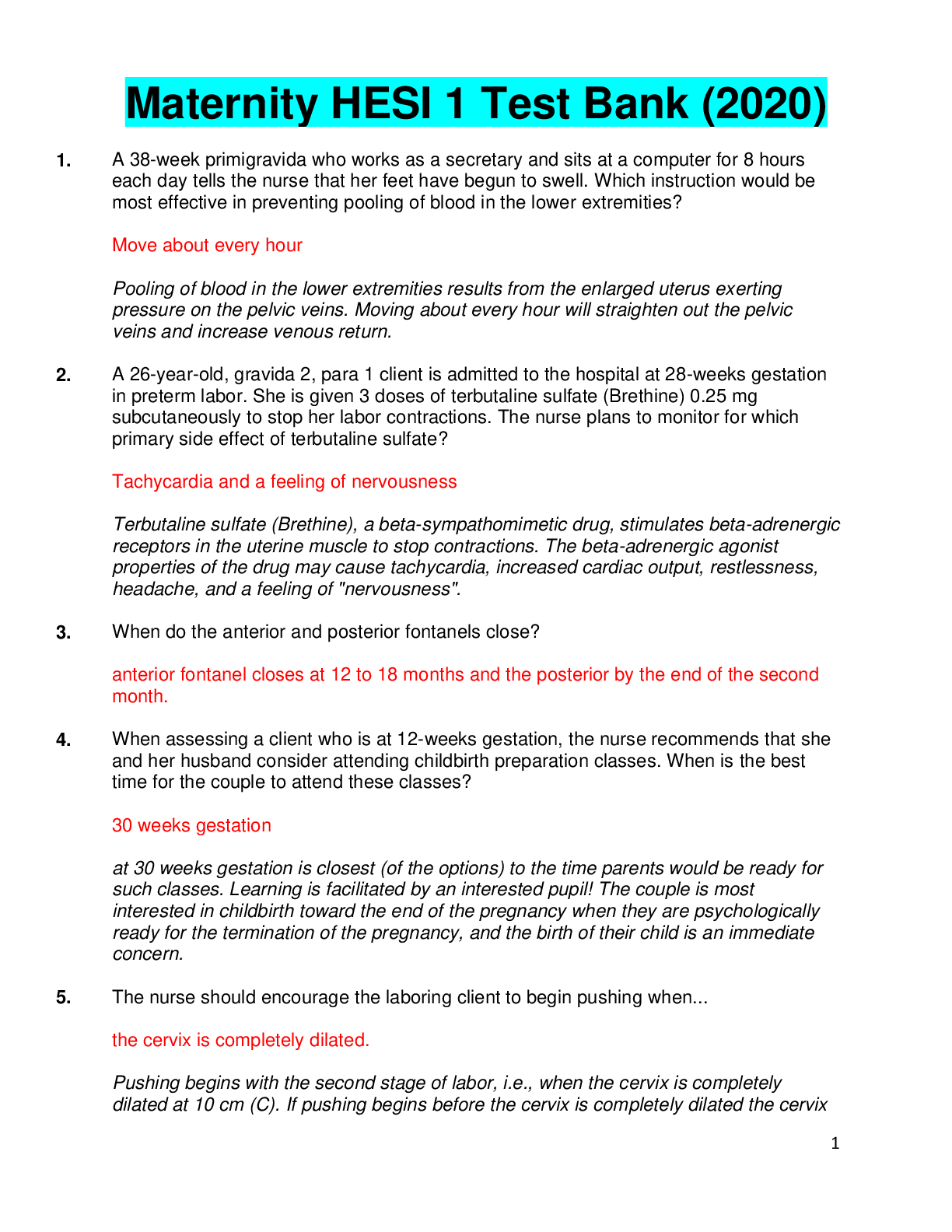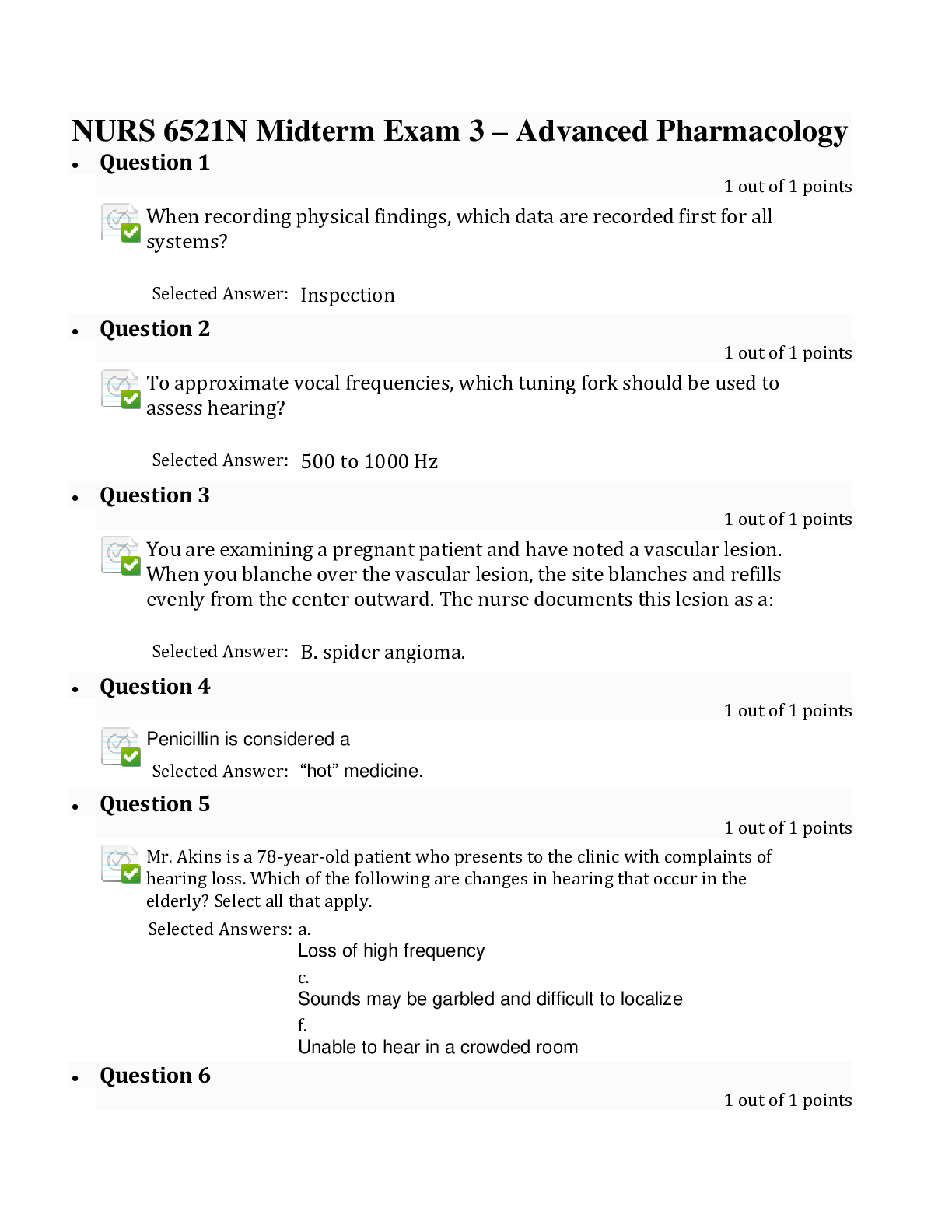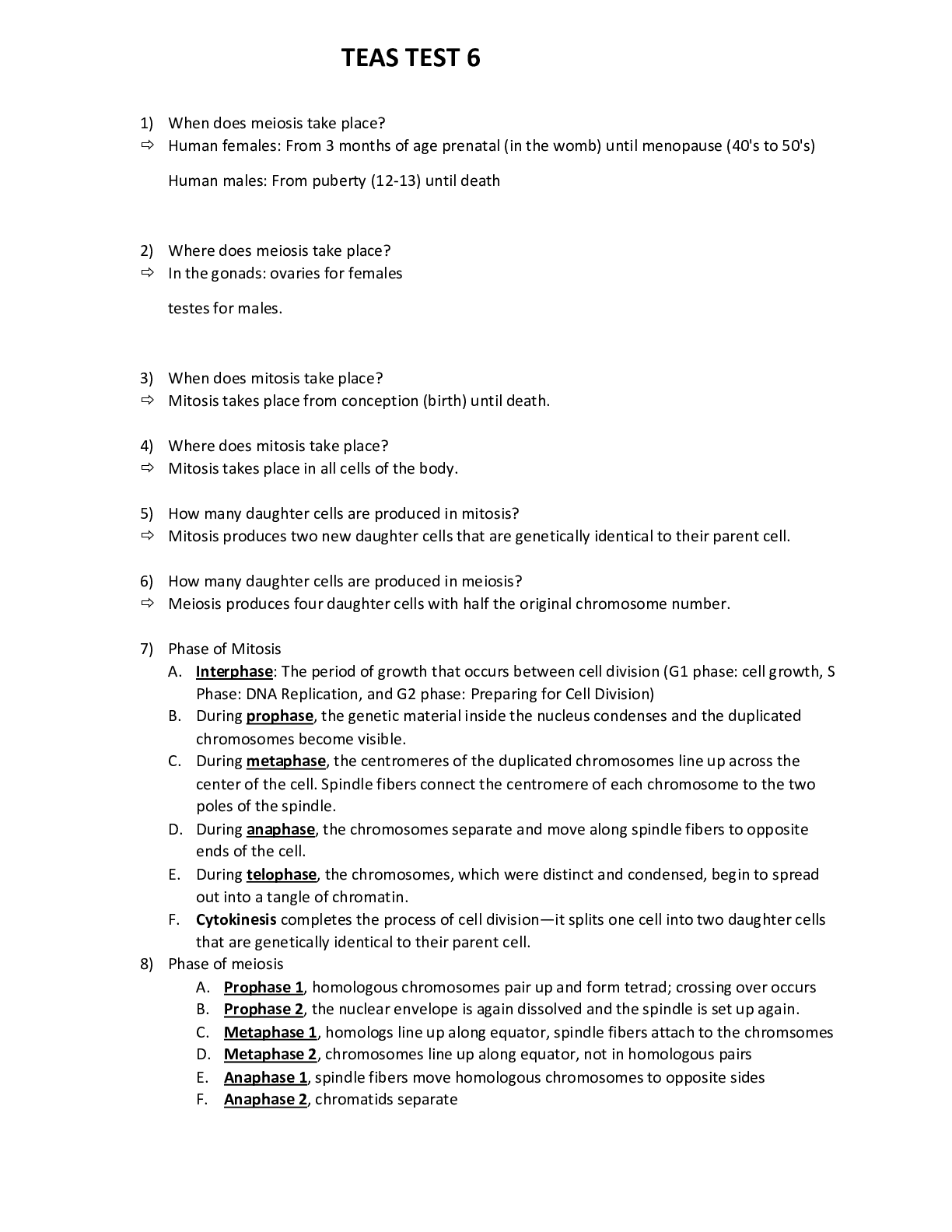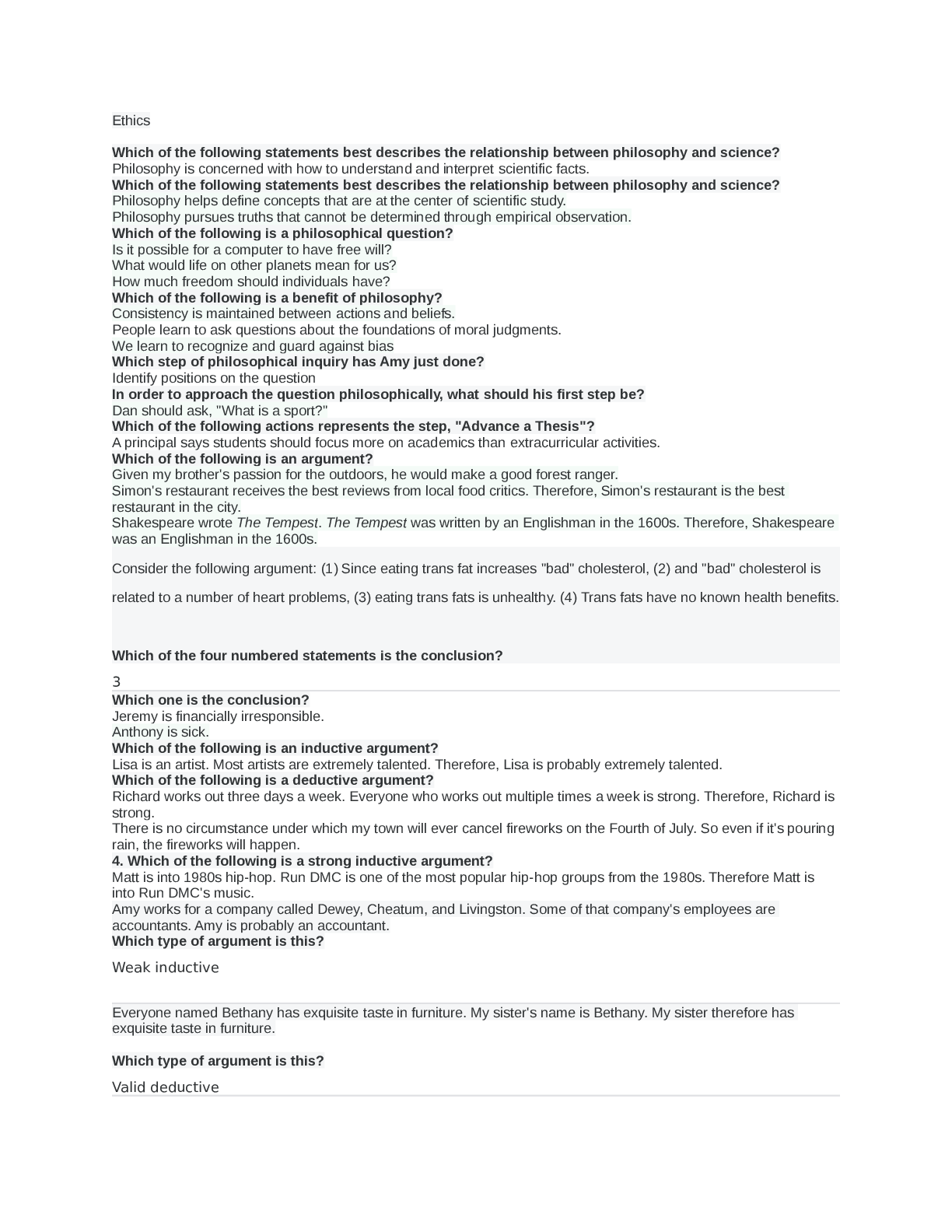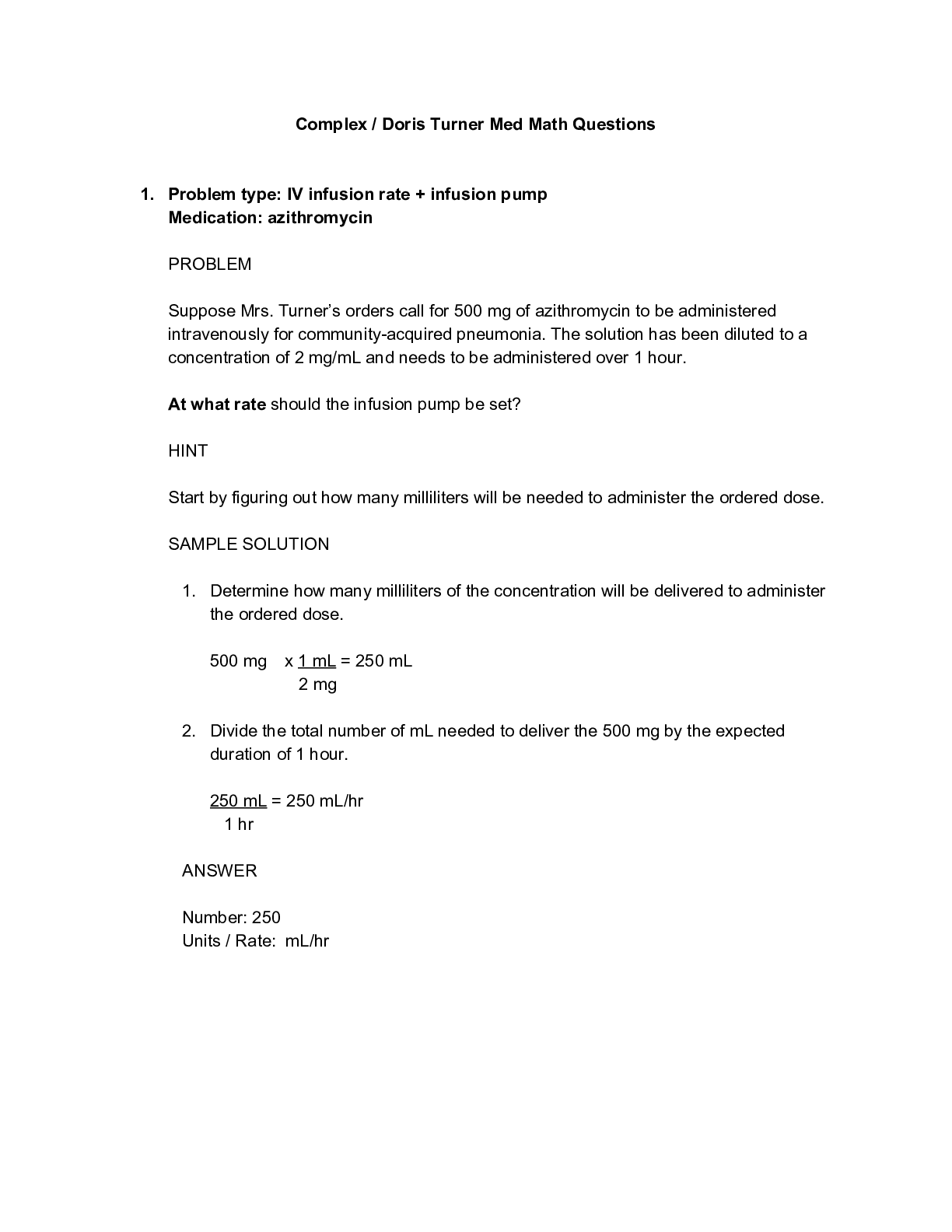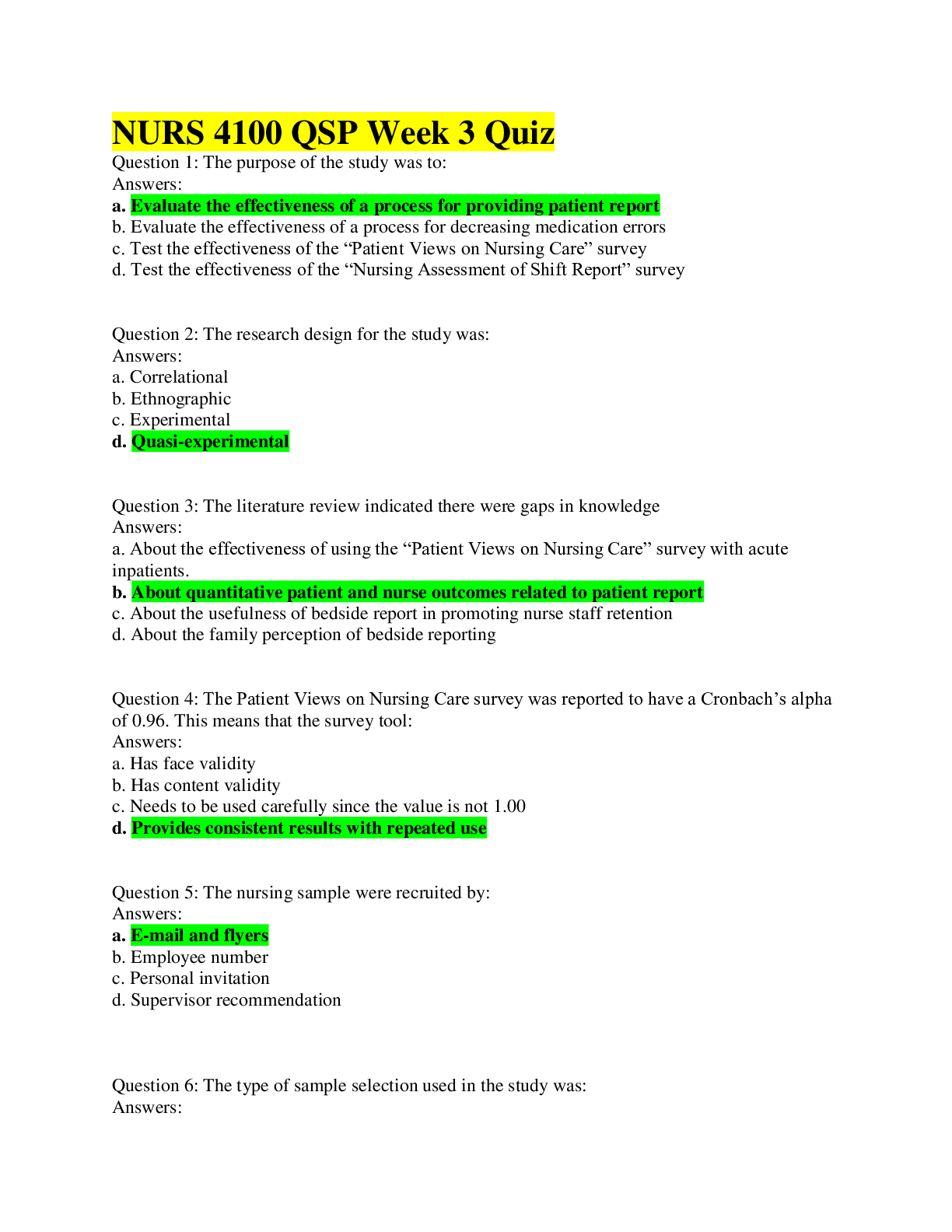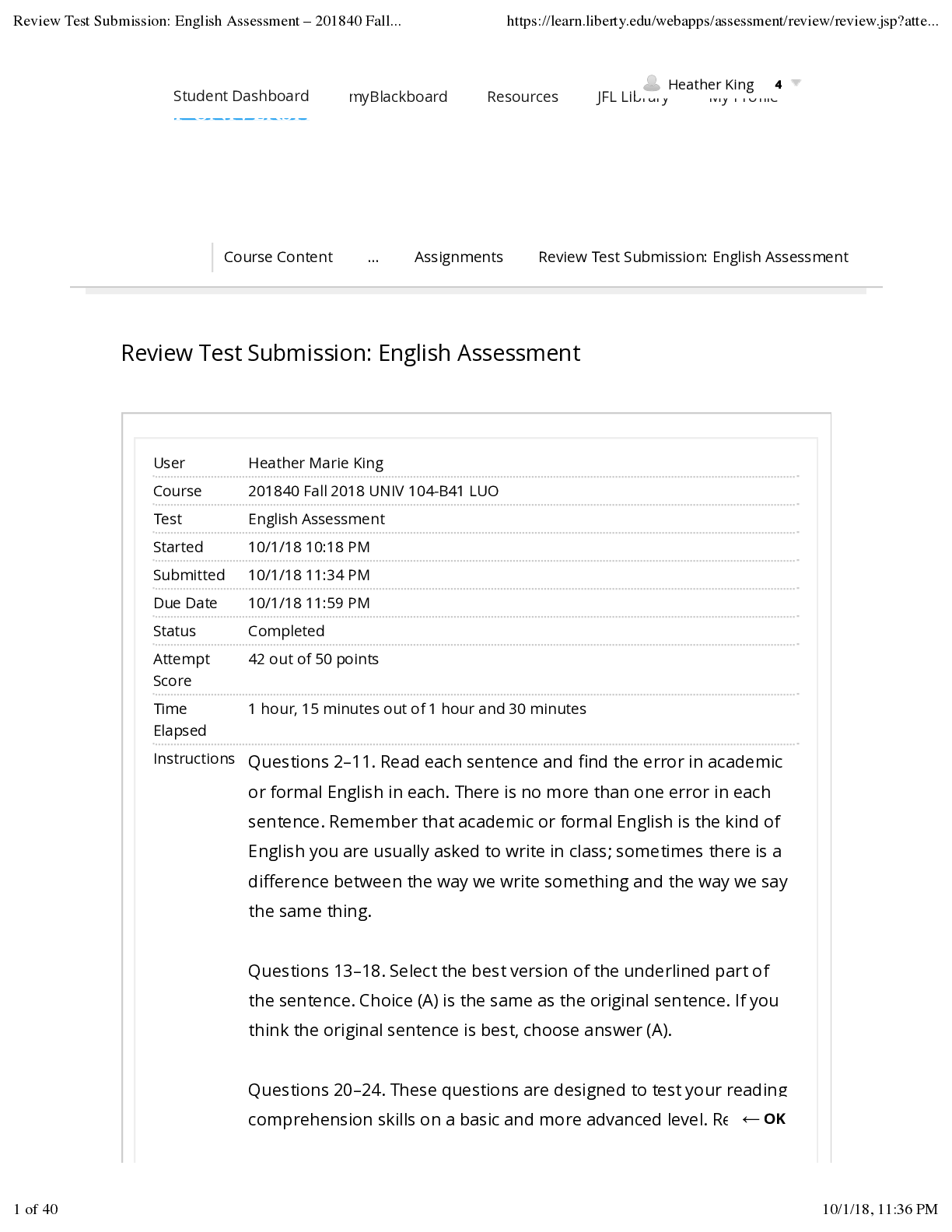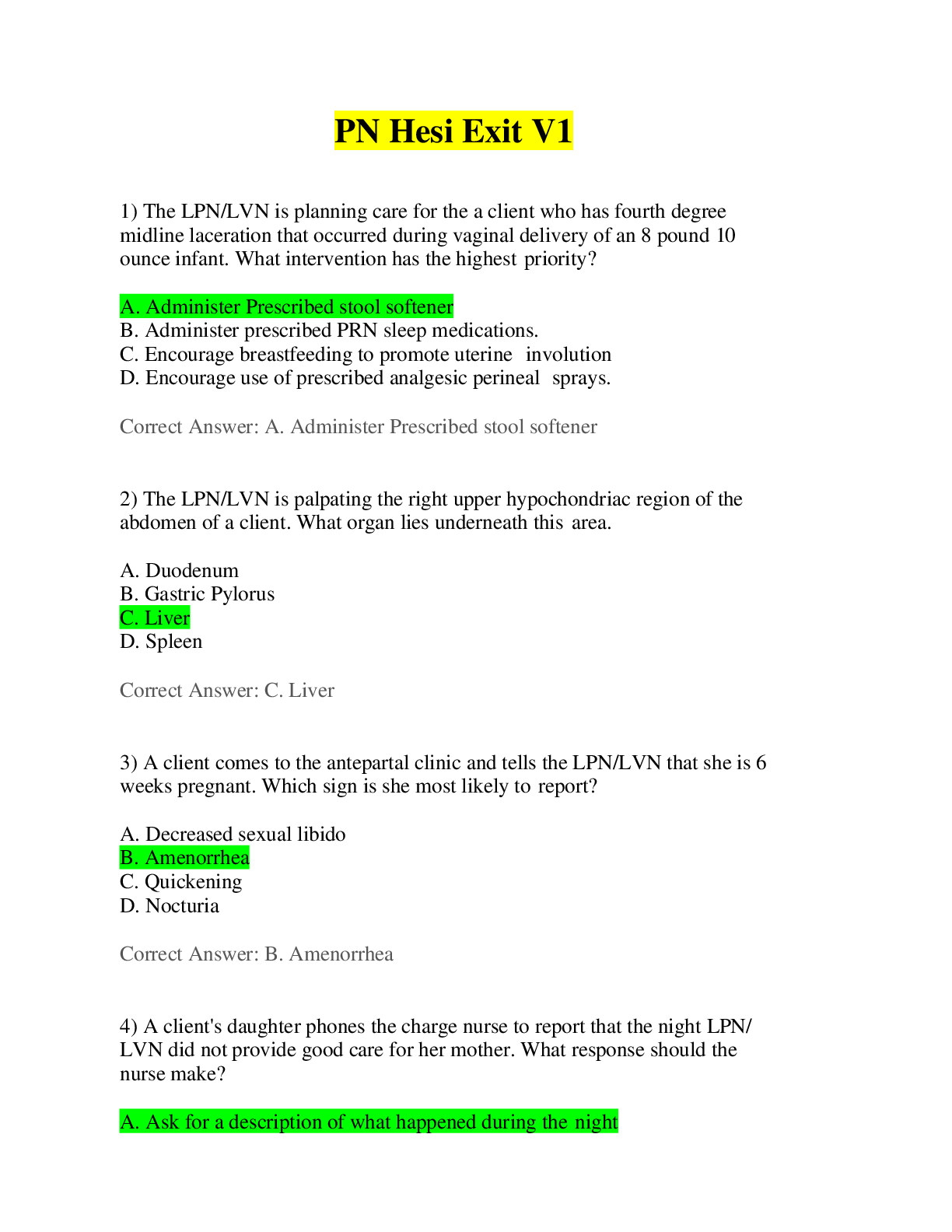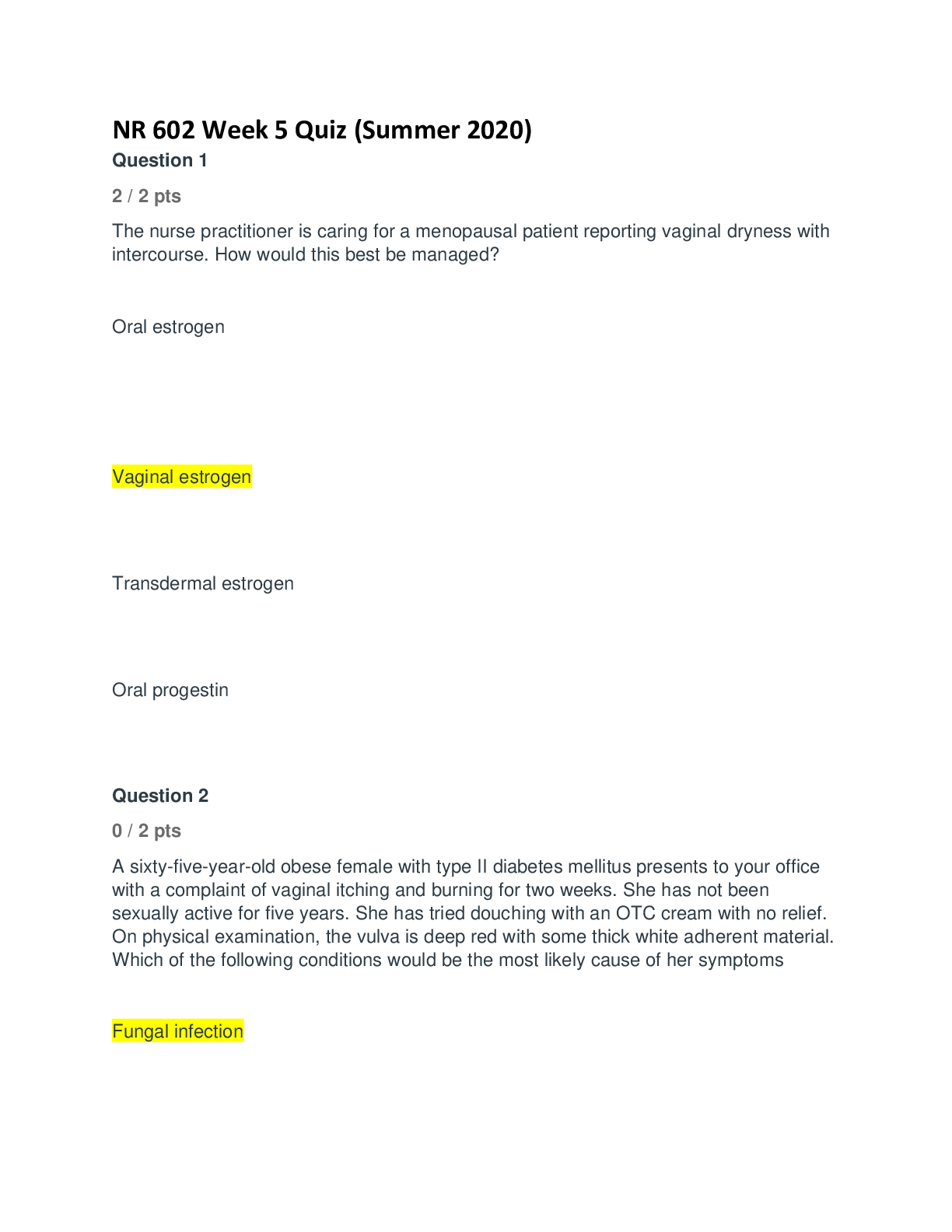*NURSING > QUESTIONS & ANSWERS > NUR 2407 ATI Pharm Made Easy - Hematalogic (Summer 2020) complete solution Help - Rasmussen College, (All)
NUR 2407 ATI Pharm Made Easy - Hematalogic (Summer 2020) complete solution Help - Rasmussen College, Ocala.
Document Content and Description Below
A healthcare professional is administering epoetin alfa (Epogen) subcutaneously to a patient who has renal failure. The healthcare professional should take which of the following actions? A) Shake... the vial before using. B) Insert the needle into the vial once. C) Dilute the drug first with normal saline. D) Save the used vial for the next dose. A healthcare professional is caring for a patient who has a known sensitivity to Escherichia coli-derived proteins. This sensitivity is a contraindication for which of the following drugs? A) Epoetin alfa (Erythropoietin). B) Oprelvekin (Neumega). C) Filgrastim (Neupogen). D) Alteplase (Activase). A healthcare professional is caring for a patient who has mild hemophila A and is about to begin taking desmopressin (DDAVP) to prevent bleeding. The healthcare professional should monitor for which of the following adverse reactions? A) Weight loss. B) Edema. C) Polyuria. D) Tachycardia A healthcare professional is caring for a patient who is about ot begin taking folic acid to treat megaloblastic anemia. The healthcare professional should monitor which of the following laboratory values? A) Amylase level. B) Reticulocyte count. C) Folic acid D) C-reactive protein. E) Creatinine clearance A healthcare professional is caring for a patient who is about to begin alteplase (Activase) therapy to treat pulmonary embolism. Which of the following drugs should the healthcare professional have available in the event of a severe adverse reaction? A) Vitamin K. B) Aminocaproic acid (Amicar). C) Protamine. D) Deferoxamine (Desferal) A healthcare professional is caring for a patient who is about to begin alteplase (Activase) therapy. The healthcare professional should monitor the patient for which of the following indications of a possible adverse effect? A) Hives. B) Headache. C) Edema. D) Hypertension. A healthcare professional is caring for a patient who is about to begin factor VIII (Advate) therapy to treat hemophilia A. When administering factor VIII, which of the following actions should the health care professional take? A) Have emergency equipment ready. B) Premedicate with aspirin (Ecotrin). C) Administer via rapid IV bolus. D) Administer the powdered form orally. A healthcare professional is caring for a patient who is about to begin taking alteplase (Activase) to treat acute myocardial infarction. The healthcare professional should understand the drug is most effective when the patient recieves is: A) 24 hr after clot formation. B) After initiation of anticoagulation. C) Prior to clot formation. D) Within 3 hr of symptom onset A healthcare professional is caring for a patient who is about to begin taking aspirin (Ecotrin) to reduce the risk of a cardiovascular event. The healthcare professional should understand that the drug inhibits platelet aggregation by which of the following mechanisms? A) Activating thromboxane A2. B) Blocking adenosine diphosphate receptor agonists. C) Suppressing specific clotting factors. D) Inhibiting cyclooxygenase action in platelets A healthcare professional is caring for a patient who is about to begin taking clopidogrel (Plavix) to prevent stent stenosis. The healthcare professional should monitor the patient for which of the following adverse reactions? A) Thrombocytopenia. B) Hyponatremia. C) Lymphocytopenia. D) Uricemia A healthcare professional is caring for a patient who is about to begin taking clopidogrel (Plavix) to prevent thrombus formation. The healthcare professional should question the use of clopidogrel by a patient who has which of the following? A) Myocardial infarction. B) Peptic ulcer disease. C) Pancreatitis. D) Myasthenia gravis A healthcare professional is caring for a patient who is about to begin taking epoetin alfa (Epogen). Which of the following laboratory values should increase with effective therapy? A) PT. B) WBC. C) Hgb. D) Platelets A healthcare professional is caring for a patient who is about to begin taking ferrous sulfate (Feosol) to treat iron-deficiency anemia. When talking with the patient about the drug, the healthcare professional should include which of the following instructions? (Select all that apply). A) Eat iron-enriched foods. B) Spread the dosage across each day. C) Take the drug on an empty stomach. D) Report dark great or black stools. E) Increase dietary fiber intake A healthcare professional is caring for a patient who is about to begin taking filgrastim (Neupogen) to treat neutropenia. The healthcare professional should assess the patient for which of the following adverse effects? A) Dusky nail beds. B) Petechiae. C) Enlarged spleen D) Swollen calf. A healthcare professional is caring for a patient who is about to begin taking iron dextran (INFeD) therapy. When administering the drug IM, the healthcare professional should take which of the following actions? (Select all that apply). A) Administer a test dose. B) Monitor blood pressure. C) Have epinephrine available. D) Premedicate with atropine. E) Use the Z-track technique A healthcare professional is caring for a patient who is about to begin taking oprelvekin (Neumega) to treat thrombocytopenia. The healthcare professional should tell the patient to report which of the following indications of an adverse reaction? (Select all that apply). A) Conjunctivits. B) Tinnitis. C) Swollen ankles. D) Jaundice. E) Palpitations A healthcare professional is caring for a patient who is about to begin taking oprelvekin (Neumega). The healthcare professional should explain to the patient that the drug has which of the following effects? A) Stimulates leukocyte maturation. B) Causes myelosuppression. C) Increases platelet production. D) Destroys blood clots A healthcare professional is caring for a patient who is about to begin taking warfarin (Coumadin). The healthcare professional should caution the patient about atking which of the following over-the-counter drugs? A) Diphenhydramine. B) Dimenhydrinate (Dramamine). C) Calcium carbonate (Tums). D) Ibuprofen (Motrin) A healthcare professional is caring for a patient who is undergoing bone marrow transplantation following high-dose chemotherapy. Which of the following drugs should the healthcare professional expect the primary care provider to prescribe to reduce the patient's risk of infection? A) Epoetin alfa (Erythropoietin). B) Oprelvekin (Neumega). C) Filgrastim (Neupogen). D) Alteplase (Activase). A healthcare professional is preparing to administer the prescribed dose of filgrastim (Neupogen) to a patient. The patient's laboratory results indicate that the patient has a WBC count of 12,000/mm^3. Which of the following actions should the healthcare professional take? A) Clarify the prescription with the provider. B) Administer the drug with an analgesic. C) Limit venipunctures. D) Assess breath sounds A healthcare professional should assess a patient who has megaloblastic anemia for indications of which of the following vitamin deficiencies? A) Vitamin B12. B) Vitamin K. C) Vitamin C. D) Vitamin D A patient is about ot begin therapy with recombinant factor IX (BeneFix) to treat hemophilia B. The patient asks the health care professional about the risk of disease transmission with recombinant factor IX, as compared with plasma-derived factor IX. The healthcare professional should explain that recombinant factor IX eliminates the risk for which of the following? A) HIV. B) Cytomegalovirus. C) Creutzfeldt-Jakob disease. D) Anaphylaxis A patient who is taking ferrous sulfate (Feosol) to treat iron-deficiency anemia develops severe nausea and vomiting due to iron toxicity. Which of the following drugs should the healthcare professional use to treat this complicatoin? A) Flumazenil (Mazicon). B) Acetylcysteine (Acetadote). C) Naloxone. D) Deferoxamine (Desferal). A patient who is taking warfarin (Coumadin) arrives at the emergency department and reports rectal bleeding. Which of the following drugs should the healthcare professional have available? A) Filgrastim (Neupogen). B) Deferoxamine (Desferal). C) Protamine. D) Vitamin K [Show More]
Last updated: 1 year ago
Preview 1 out of 10 pages
Instant download
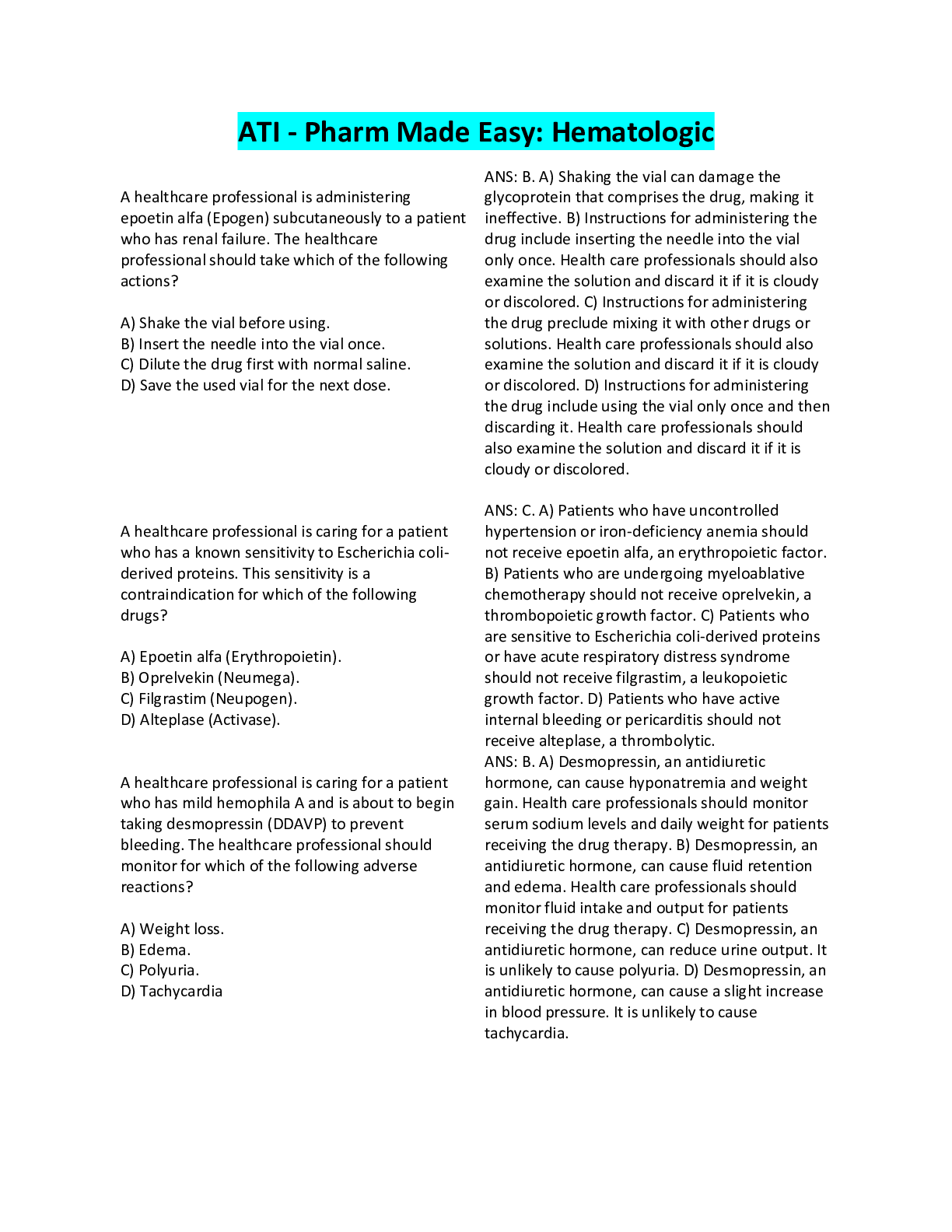
Buy this document to get the full access instantly
Instant Download Access after purchase
Add to cartInstant download
Reviews( 0 )
Document information
Connected school, study & course
About the document
Uploaded On
Apr 29, 2020
Number of pages
10
Written in
Additional information
This document has been written for:
Uploaded
Apr 29, 2020
Downloads
0
Views
51

.png)
